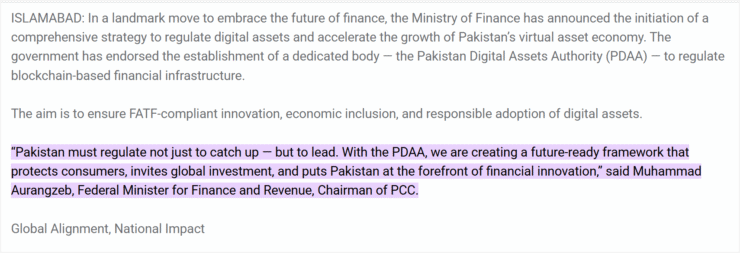In a major policy pivot, Pakistan has announced the formation of the Pakistan Digital Assets Authority (PDAA)—a dedicated regulatory body designed to oversee the country’s fast-growing crypto and blockchain sector. Backed by the Ministry of Finance and officially reported by state broadcaster PTV on May 21, the PDAA will supervise a wide range of digital financial activities, including cryptocurrency exchanges, wallets, custodial services, stablecoins, tokenization platforms, and DeFi protocols.
The PDAA’s mission goes beyond oversight. A key element of its mandate is to tokenize government assets and public debt, a move aimed at improving liquidity and transparency in state finance. The agency will also manage the rollout of regulated Bitcoin mining operations as part of a national energy monetization plan—transforming excess electricity into potential revenue.

Federal Finance Minister Muhammad Aurangzeb called the initiative a bold step toward modernization.
“With the PDAA, we are laying the foundation for a regulatory framework that safeguards consumers, welcomes global investment, and positions Pakistan as a hub for financial innovation,” he said.
This represents a sharp reversal from earlier policy stances, as Pakistan moves from skepticism to strategic embrace of digital assets as catalysts for growth and modernization.
PDAA to Oversee Tokenization, Mining, and Web3 Expansion
The PDAA’s responsibilities extend far beyond traditional regulation. The agency will drive tokenization of state assets, oversee Bitcoin mining pilot programs, and support Web3 infrastructure through local startup development and blockchain innovation grants.
These efforts are part of a broader digital strategy outlined by the Pakistan Cryptocurrency Council, an industry advisory body established in March 2025. The Council includes prominent international figures—most notably former Binance CEO Changpeng Zhao, now serving as a senior advisor on Pakistan’s blockchain roadmap.
“This isn’t just about crypto,” said Council CEO Bilal Bin Saqib.
“It’s about building a next-generation financial ecosystem—one that leverages tokenization, Web3, and decentralized innovation to create new economic pathways for the country.”
The PDAA will also integrate compliance frameworks recommended by the Federal Investigation Agency (FIA), including enhanced anti-money laundering (AML) procedures, Know Your Customer (KYC) protocols, and counter-terrorism safeguards.
Pakistan Ranks Among Crypto Adoption Leaders in 2024
Pakistan’s new regulatory direction comes amid surging public adoption. In 2024, the country ranked ninth globally in Chainalysis’ Crypto Adoption Index—just one year after senior officials dismissed digital assets as incompatible with international standards.
In May 2023, then-Minister of State for Finance Aisha Ghaus Pasha had stated that Pakistan would never legalize crypto, citing risks of misuse and Financial Action Task Force (FATF) violations. Since then, however, sentiment has shifted dramatically, both in government and among citizens.
According to Statista, Pakistan’s digital asset market is growing rapidly, with user numbers projected to exceed 27 million by 2025—roughly 11% of the population. Market revenue is forecast to reach $1.6 billion next year, putting Pakistan on the map as a major emerging player in crypto adoption.
Quick Facts
- Pakistan has launched the Pakistan Digital Assets Authority (PDAA) to regulate crypto and blockchain activities.
- The PDAA will oversee asset tokenization, Bitcoin mining, and DeFi protocols, while also supporting Web3 startups.
- Pakistan now ranks 9th in global crypto adoption, with over 27 million users expected by 2025.
- The country’s digital asset market is projected to generate $1.6 billion in revenue next year.





